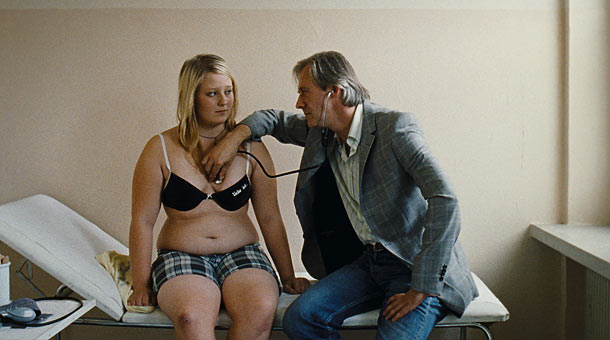
Repetition and patterns in action mimic the diet camps call for discipline, which serves as an overall metaphor for shaping youth to fit into an adult world.

Repetition and patterns in action mimic the diet camps call for discipline, which serves as an overall metaphor for shaping youth to fit into an adult world.
A highly anticipated screening I attended here at Berlinale was Ulrich Seidl’s third installment of his Paradise trilogy, Paradise: Hope. I have only seen one other film in the Paradise trilogy, which was Paradise: Love, but this did not impact my reception or understanding of the film, as Paradise: Hope is perfectly capable of standing alone because it runs parallel to the other two films.
I have always appreciated the efforts of taking traditional story-lines and presenting them in exceptionally non-traditional ways. Paradise: Hope tells the usual story of desire for a love unattainable and the potential security that might come with it. This desire, however, is found between a thirteen year-old girl, Melanie–at a diet camp in Austria–and the camp’s fifty-something year old doctor. It is a coming of age film, and a journey of self-discovery for both sides of situation. In between the camp’s strict regimen of exercise and nutrition classes, hilariously presented, the youth of the camp spend their time being curious and frustrated pubescent teens. The film keeps a steady pace, splitting its time between the love story of the doctor and Melanie, the antics of being in the camp.
Paradise: Hope is very minimalistic. This is accented in the fact that the entire camp, consisting of twenty-four kids, is held on a massive campus. Seidl succeeds in keeping the story on track, regardless of the extreme nature of the setting, by ignoring societal norms that would otherwise carry issue. The doctor is never demonized, and the question of age is never addressed; to the point that when Melanie asks the doctor why they cannot be together, age is not brought up.

Aesthetically, the film takes advantage of long takes, as well as owning the silence that often falls between the doctor and Melanie. Both actors are brilliant at expressing themselves without words, and when they do speak the words are simple and short, further adding to Seidl’s minimalism. Repetition and patterns in action mimic the diet camps call for discipline, which serves as an overall metaphor for shaping youth to fit into an adult world.
The film also has an exceptionally organic feel to the image with natural light elements, diffusion, and stark film grain. This organic feel adds to the idea of adolescent growth and development. I found Paradise: Hope to carry a powerful voice in telling a rich and involving story about life, love and growth. However, I will add its minimalism, symbolism, and foreign nature might not please everybody, but I would definitely say it is worth a look.